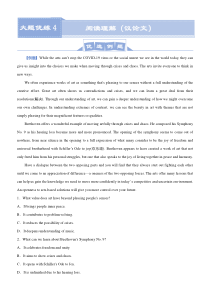 DOC
DOC
【文档说明】(新高考)高考英语三轮冲刺大题优练4 阅读理解 议论文(解析版).doc,共(13)页,133.000 KB,由MTyang资料小铺上传
转载请保留链接:https://www.ichengzhen.cn/view-29830.html
以下为本文档部分文字说明:
【例题】Whiletheartscan’tstoptheCOVID-19virusorthesocialunrestweseeintheworldtoday,theycangiveusinsightintothechoiceswema
kewhenmovingthroughcrisesandchaos.Theartsinviteeveryonetothinkinnewways.Weoftenexperienceworksofartassometh
ingthat'spleasingtooursenseswithoutafullunderstandingofthecreativeeffort.Greatartoftenshowsuscontradictionsandcrises,andwecanlear
nagreatdealfromtheirresolutions(解决).Throughourunderstandingofart,wecangainadeeperunderstandingofhowwemightovercomeourownchallenges.Inunderstandin
gextremesofcontrast,wecanseethebeautyinartwiththemesthatarenotsimplypleasingfortheirmagnificentfeatures
orqualities.Beethovenoffersawonderfulexampleofmovingartfullythroughcrisesandchaos.HecomposedhisSymphonyNo.9ashishearinglossbecamemoreandmoreprono
unced.Theopeningofthesymphonyseemstocomeoutofnowhere,fromnearsilenceintheopeningtoafullexpressionofwhatmanyconsidertobethejoyoffr
eedomanduniversalbrotherhoodwithSchiller’sOdetojoy(欢乐颂).Beethovenappearstohavecreatedaworkofartthatnoton
lyfreedhimfromhispersonalstruggles,butonethatalsospeakstothejoyoflivingtogetherinpeaceandharmony.Haveadialoguebetweenthetwoopposingp
artsandyouwillfindthattheyalwaysstartoutfightingeachotheruntilwecometoanappreciationofdifference—aonenessofthetwoopposingforces.Theartsofferma
nylessonsthatcanhelpusgaintheknowledgeweneedtomovemoreconfidentlyintoday’scompetitiveanduncertainenvironment.Anopennes
stoarts-basedsolutionswillgiveyoumorecontroloveryourfuture.1.Whatvaluedoesarthavebeyondpleasingpeople'ssenses?A.Itbringspeopleinne
rpeace.B.Itcontributestoproblem-solving.C.Itreducesthepossibilityofcrises.D.Itdeepensunderstandingofmusic.2.WhatcanwelearnaboutBeethoven'sSymphon
yNo.9?A.Itcelebratesfreedomandunity.B.Itaimstoshowcrisesandchaos.C.ItopenswithSchiller'sOdetoJoy.D.Itisunfinishe
dduetohishearingloss.优选例题阅读理解(议论文)大题优练43.Whatistheauthor'ssuggestionondealingwithconflictingforces?A.Leavingthingsastheyare.B.Makingachoicebetweent
hem.C.Separatingthemfromeachother.D.Engagingtheminaconversation.4.Whichofthefollowingcanbethebesttitleforthetext?A.HowCOV
ID-19changesartB.EssentialsofSymphonyNo.9C.MovingartfullythroughcrisesD.JoyintheeyesofBeethoven【答案】1.B2.A3.D4.C【解析】本文是一篇议论文。文章主要介绍了在
疫情影响下的世界背景中,艺术为我们提供了应对危机和冲突的创造性思路。1.细节理解题。根据文章第二段第二句Greatartoftenshowsuscontradictionsandcrises,andweca
nlearnagreatdealfromtheirresolutions.(伟大的艺术作品向我们展示冲突与危机,我们能从它们的解决中获得启示。)可知,理解艺术有助于现实中问题的解决。故选B。2.细节理解题。根据文章第三段第三句
Theopeningofthesymphonyseemstocomeoutofnowhere,fromnearsilenceintheopeningtoafullexpressionofwhatmanyconsidert
obethejoyoffreedomanduniversalbrotherhoodwithSchiller’sOdetojoy.(这首交响曲的开头似乎毫无来由,从几乎寂静的开头,许多人认为是对自由的喜悦和全世界兄弟般情谊的《欢乐颂》的充分表达。)可知,贝
多芬的第九交响曲歌颂的主题是自由与团结。故选A。3.推理判断题。根据文章第四段第一句Haveadialoguebetweenthetwoopposingpartsandyouwillfindthattheyal
waysstartoutfightingeachotheruntilwecometoanappreciationofdifference—aonenessofthetwoopposingforces.(如果你让对立的这两
个部分进行对话,你就会发现它们总是从一开始就互相争斗,直到我们对它们之间的差异有了一个正确的认识——这两个对立的力量是一体的。)可推断,作者对于处理冲突各方的建议是让各方进行对话、交流。故选D。4.主旨大意题。根据第一段Whi
letheartscan'tstoptheCOVID-19virusorthesocialunrestweseeintheworldtoday,theycangiveusinsightintothechoiceswemakewhenmovingthroughcrisesandchaos.Th
eartsinviteeveryonetothinkinnewways.(虽然艺术无法阻止COVID-19病毒或我们今天在世界上看到的社会动荡,但它们可以让我们了解我们在应对危机和混乱时所做的选择。艺术邀
请每个人以新的方式思考。)结合全文内容可知,文章主要介绍的是理解艺术对于应对现实危机与冲突的启示。所以“Movingartfullythroughcrises(艺术地通过危机)”作为文章标题最为合适。
故选C。(一)I’verecentlyfoundmyselfwonderingifIcoulddowithoutGoogleMaps.Itis,Ithink,theonlyapponmyphoneI’dreallymisswereItoswapmysmartphonefor
a“dumb”onethathandlesonlycallsandtextmessages.WhyamIthinkingaboutthis?It’sbecauseeverytimeItrytoreadabook
,Ienduppickingupmyphoneinstead.IkeepinterruptingmyowntrainofthoughtinordertodosomethingthatIdon’tconsciouslyw
anttodo.Thisisnotaccidental.Developershavebecomeevenmoreunashamedintheirattemptstokeepushookedonoursmartphones.Some
ofthemspeakinthelanguageofaddictionandbehaviouralpsychology,thoughmostprefertheterm“persuasivetech”.Initself,persuasivetechisnotanewidea—anacademi
cnamedBJFogghasbeenrunningclassesfroma“persuasivetechlab”atStanfordsincethelate1990s.Butassmartphoneownershi
phasrocketedandsocial-mediasiteshavebeenborn,persuasivetechhasvastlyexpandeditsreach.Onecompany,DopamineLabs—namedforthechemica
lreleasedintherewardcenterofthebrain—offersaservicetotechbusinesseswantingto“keepusersengaged”.FounderRamsayBrowntellsmehewantspeopletounder
standthat“theirthoughtsandfeelingsareonthetableasthingsthatcanbecontrolledanddesigned”.Hethinksthereshouldb
emoreconversationaroundthepersuasivepowerofthetechnologiesbeingused.“Webelieveeveryonehasarighttocognitiveliberty,andtobuildthekindofmindtheywantto
livein,”hesays.TheposterchildoftheresistancemovementagainstaddictiveappsisformerGoogle“designethicist”TristanHarris.Hethinksthepowerto
changethesystemliesnotwithappdevelopersbutwiththehardwareproviders.In2014,Harrisfounded“TimeWellSpent”,agroupthatcampaigns
formoremoraldesignpracticesamongdevelopers.Anytechbusinessthatreliesonadvertisingprofitsismotivatedtoholditsusersonlineforas
longaspossible,Harrissays.Thismeansappsarespecificallydesignedtokeepusinthem.Apple,ontheotherhand,wantstosellphonesbut
doesn’thaveaprofitstreamsotightlyconnectedtotheamountoftimeitscustomersspendonline.HarrishopesthatcompanieslikeApplecouldusetheirinf
luencetoencouragemoremorallydesignedapps.WhileIwaitforAppletosortthisout,Ifindmyselflongingforsomethingcalleda“LightPhone”,acr
edit-card-sizedhandsetthatdoesabsolutelynothingbutmakeandreceivecalls.Pricetag?$150.Seemsexpensive.Butthecompany’swebsiteisver
ypersuasive.5.Accordingtotheauthor,whatmakesussogluedtooursmartphones?A.People'sinbornbehaviours.B.Appdevelopers’intentionC.User-friendlyapp
sD.Hardwareproviders6.WhatdoesDopamineLabs'sfounderbelieve?A.Techbusinesseshavegonetoofarincontrollingusers’m
inds模拟优练B.Persuasivetechnologiesaredangeroustousers’cognitiveliberty.C.Thepersuasivepowerofthetechnologie
sdeservesmoreattentionD.Everyonecanlivethelifetheydesirebyusingpersuasivetechnologies.7.Whichofthefollowingbestexpla
instheunderlinedwords“Theposterchild”inparagraph5?A.TheadvertiserB.TheadvocateC.TheopponentD.Thefounder8.Whatcanbeasui
tabletitleforthetext?A.Dowehavearighttocognitiveliberty?B.Whathavepersuasivetechdonetous?C.Whyadumbphoneisasmartmove?D.Howsmar
tphonesshapeourminds?【答案】5.B6.C7.B8.C【解析】这是一篇议论文。作者主要讲述为什么要把智能手机换成傻瓜手机。5.细节理解题。根据第三段第一句话“Thisisnotaccidental.D
evelopershavebecomeevenmoreunashamedintheirattemptstokeepushookedonoursmartphones.”(发生这一切不是偶然的。为了让我们一刻都离不开我们的
智能手机,开发人员的手段越来越肆无忌惮了。)可知,开发人员想尽一切办法让我们离不开手机,所以我们对手机上瘾是开发人员有意为之的。故选B。6.细节理解题。根据题干DopamineLabs'sfounder定位到第四段,再根据第四段倒
数第二句“Hethinksthereshouldbemoreconversationaroundthepersuasivepowerofthetechnologiesbeingused.”(他认为,应该对说服技术的使用进
行更广泛的讨论。)可知C选项表达了他的看法。故选C。7.词句猜测题。根据本句后半部分isformerGoogle“designethicist”TristanHarris.(是前谷歌“设计伦理学家”特里斯坦•哈里斯。)可知,主语应该指
人,再结合横线后theresistancemovementagainstaddictiveapps(抵制易上瘾应用运动)以及Hethinksthepowertochangethesystemliesnotwithappdevelopersbutwiththehar
dwareproviders.In2014,Harrisfounded“TimeWellSpent”,agroupthatcampaignsformoremoraldesignpracticesamongdevelopers.(他认为,改变
目前这一体系的力量不掌握在应用开发人员手上,而掌握在硬件提供商手中。早在2014年,哈里斯就创建了一个名叫“光阴不虚度”组织,呼吁开发公司在应用开发过程中坚持设计伦理。)可知,哈里斯是抵制易上瘾应用运
动的代表人物,所以Theposterchild应指该运动的支持者,代表人物;A.Theadvertiser顾问;B.Theadvocate支持者;C.Theopponent反对者;D.Thefounder创始人。故选B。8.主旨大意题。通读全文,第一段作者提出Iti
s,Ithink,theonlyapponmyphoneI’dreallymisswereItoswapmysmartphonefora“dumb”onethathandlesonlycallsandtextmessages.(如果我要将现在的智能手机换成只能打电话、发短信的
“傻瓜”手机,它(谷歌地图)可能是我唯一真正想念的一个应用了);第二段It’sbecauseeverytimeItrytoreadabook,Ienduppickingupmyphoneinstead.Ikeepinterruptingmyowntrainofthoughtinordertodo
somethingthatIdon’tconsciouslywanttodo.(因为每当我想读会儿书时,我最终拿起的却是手机。为了做一些我不愿做的事,我不停地打断自己的思路。)进一步说明自己想换“傻瓜”手机的理由;第三、四、五段引
用科学研究理论来说明手机正试图改变你大脑中的化学成份,让你花更多时间做你不想做的事情,以及技术界试图帮助我们重新获得自控力等理论依据,可知,本文主要讲述为什么要把智能手机换成傻瓜手机。故选C。(二)Weh
avetomakecertainourlimitedmoneyiswellspent.Butwhatshouldwespendourmoneyon?A20-yearstudyconductedbyDr.Gilovich,aprofess
oratCormellUniversity,reachedapowerfulandstraightforwardconclusion:don'tspendyourmoneyonthings.Thetroublewiththingsisthatth
ehappinesstheyprovidepetersout.Wegetusedtonewpossessions,andwhatonceseemedexcitingquicklybecomesthenorm.
Wekeepraisingthebarandalwayslookforanevenbetterone.Possessions,bytheirnature,causecomparisons.Webuyane
wcarandarethrilledwithituntilafriendbuysabetterone—andthere'salwayssomeonewithabetterone.Mostofususuallyassumethatthehappinesswegetfr
ombuyingsomethingwilllastaslongasthethingitself.Itseemsintuitive(直觉的)thatinvestinginsomethingwecansee,hear,andtouchonapermanentbasisdeliversthebest
value.Butit'snotthecaseatall.Gilovichhasfoundthatexperiencesdelivermore-lastinghappinessthanthings.Experi
encesbecomeapartofouridentity.Everyone'sexperienceisunique.Wearenotourpossessions,butwearetheaccumulationofeverythingwe'veseen,thethingswe'vedone,and
theplaceswe'vebeento.“Ourexperiencesareabiggerpartofourselvesthanourmaterialgoods,”saidGilovich.“Youcanreallylikeyourmaterialstuff.Youcaneventhink
thatpartofyouridentityisconnectedtothosethings,buttheyremainseparatefromyou.Incontrast,yourexperiencesreallyarepartofyou
.Wearethesumtotalofourexperiences.”Besides,wedon'tcompareexperiencesinthesamewaythatwecomparethings.It'shardtoquantifytherelativevalu
eofanytwoexperiences,whichmakesthemthatmuchmoreenjoyable.Andexpectationofanexperiencecausesexcitementandenjoyment,whileexpectation
ofobtainingapossessioncausesimpatience.Experiencesareenjoyablefromtheveryfirstmomentsofplanning,allthewaythroughtothememoriesyoukeepforeve
r.Thetemporaryhappinessachievedbybuyingthingscanberegardedas“puddles(水坑)ofpleasure.”Inotherwords,thatkindofhappinessevaporates(蒸发)quicklyan
dleavesuswantingmore.Thingsmaylastlongerthanexperiences,butthememoriesthatremainarewhatmattermost.9.Theunderlinedphrase“petersout”canberep
lacedby_________________.A.diesawayB.istoolittleC.isnotrealD.coststoomuch10.WhatdoesGilovichthinkofexperience
s?A.Experiencesdeliverless-lastinghappinessthanthings.B.Experiencescanexistinourmemoryforever.C.Ourexperiencestakeupallpartsofourselves.D.Oure
xperiencesarewhatseparateusfromothers.11.Whatcanbeinferredfromthepassage?A.ExperiencescanbecomparedwitheachotherB.Exp
ectinganexperienceincreasesourfeelingofanxietyC.PeoplearemorelikelytobeimpatientwhenbuyingthingsD.Spiritua
lwealthisthemostvaluableforus12.Whichisthemainideaofthepassage?A.Howcanwegainhappinesswithmoney?B.Howcanwemakehappinesslastlong?C.Whyshou
ldwespendmoneyonexperiencesinsteadofthings?D.Whydoexperiencesachievepermanenthappinessthanthings?【答案】9.A10.D11.D12.C【解析】本文是一篇议论文,作者
论证说明了一个道理“为什么要把钱花在经历上,而不是事物上”。9.词句猜测题。根据划线短语所在句后一句提到“Wegetusedtonewpossessions,andwhatonceseemedexcitingquickly
becomesthenorm.”(我们习惯了新拥有的东西,曾经令人兴奋的东西很快就变成了常态。),即可推断出新拥有的东西,能够带来的快乐是短暂的,很快就会“消失”,petersout对应的同义词应是“dieaway”,故选A。10.细节理解题。根据第二段提到“Gilovichhasfoun
dthatexperiencesdelivermore-lastinghappinessthanthings.Experiencesbecomeapartofouridentity.Everyone'sexperienceisunique.”(吉洛维奇发现,
体验比物质更能带来持久的幸福。经历成为我们身份的一部分。每个人的经历都是独一无二的。)可知,吉洛维奇(Gilovich)认为经历是个人身份的象征,个人的经历形成与他人的区别,故选D。11.推理判断题。根据第二段首句提到“Thetroublewiththingsisthatthehappines
stheyprovidepetersout.”(问题是,事物所带来的快乐会逐渐消失。)及第三段首句提到“Gilovichhasfoundthatexperiencesdelivermore-lastinghappinessthanthings.”(吉洛维奇发现,体验比物
质更能带来持久的幸福。)及最后一段最后一句提到“Thingsmaylastlongerthanexperiences,butthememoriesthatremainarewhatmattermost.”(事物可能比经历更持久,但留下的记忆才是最
重要的。)可推断出,在作者的观点看来,事物可能留存的时间比经历更久,但是并不能带来长久的幸福,而经历留下的精神财富才是最重要的,故选D。12.主旨大意题。通读全文内容可知,本文主要讲述了事物能够带来的幸福是短暂,经历留下来的精神财富才是最重要的;再根据第一段首句,引出文章主题“We
havetomakecertainourlimitedmoneyiswellspent.Butwhatshouldwespendourmoneyon?”(我们必须确保有限的钱花得值。但是我们应该把钱花在什么地方呢),所以本文主要想表达的主题是“为什么要把钱花
在经历上,而不是事物上”,故选C。(三)It'scommonknowledgethatthewomaninLeonardodaVinci'smostfamouspaintingseemstolookbackatobservers,fo
llowingthemwithhereyesnomatterwheretheystandintheroom.Butthiscommonknowledgeturnsoutwrong.Anewstudyfindsthatthewomaninthepaintingisactuallylooking
outatananglethat’s15.4degreesofftotheobserver'sright-welloutsideoftherangethatpeoplenormallybelievewhentheythinksomeoneislook
ingrightatthem.Inotherwords,saidthestudyauthor,Horstmann,“She’snotlookingatyou.”Thisissomewhatironic,becausetheentirephenomenonofaperson'sgaze(凝视)i
naphotographorpaintingseemingtofollowthevieweriscalledthe"MonaLisaeffect".Thateffectisabsolutelyreal,Horstmannsaid.Ifapers
onisillustratedorphotographedlookingstraightahead,evenpeopleviewingtheportraitfromananglewillfeeltheyarebeinglooked
at.Aslongastheangleoftheperson'sgazeisnomorethanabout5degreesofftoeitherside,theMonaLisaeffectoccurs.Horstmannandhisco-authorwerestudyingthi
seffectforitsapplicationinthecreationofartificial-intelligenceavatars(虚拟头像)whenHorstmanntookalonglookatthe“MonaLisa”andrealized
shewasn'tlookingathim.Tomakesureitwasn'tjusthim,theresearchersasked24peopletoviewimagesofthe“MonaLisa"onacomputerscreen.Theysetarulerbetweenth
eviewerandthescreenandaskedtheparticipantstonotewhichnumberontherulerintersectedMonaLisa’sgaze.TocalculatetheangleofMonaLis
a’sgazeasshelookedattheviewer,theymovedtherulerfartherfromorclosertothescreenduringthestudy.Consistently,theresearche
rsfound,participantsjudgedthatthewomaninthe“MonaLisa”portraitwasnotlookingstraightatthem,butslightlyofftotheirright.Sowhydopeoplere
peatthebeliefthathereyesseemtofollowtheviewer?Horstmannisn’tsure.It’spossible,hesaid,thatpeoplehavethedesiretobeloo
kedat,sotheythinkthewomanislookingstraightatthem.Ormaybethepeoplewhofirstcoinedtheterm“MonaLisaeffect”justthoughtitwa
sacoolname.13.Whatisgenerallybelievedaboutthewomaninthepainting“MonaLisa”?A.Sheattractstheviewerstolookback.
B.Sheseemsmysteriousbecauseofhereyes.C.Shefixeshereyesonthebackoftheviewers.D.Shelooksattheviewerswherevertheystan
d.14.WhatgazerangeinapaintingwillcausetheMonaLisaeffect?A.B.C.D.15.Whywastheexperimentinvolving24peop
leconducted?A.ToconfirmHorstmann'sbelief.B.Tocreateartificial-intelligenceavatars.C.TocalculatetheangleofMonaLisa’
sgaze.D.ToexplainhowtheMonaLisaeffectcanbeapplied.16.Whatcanwelearnfromthetext?A.Horstmannthinksit’scooltoco
intheterm"MonaLisaeffect”B.TheMonaLisaeffectcontributestothecreationofartificialintelligence.C.FeelingbeinggazedatbyM
onaLisamaybecausedbythedesireforattentionD.Thepositionoftherulerintheexperimentwillinfluencetheviewers'judgment【答案】13.D14.B
15.A16.C【解析】这是一篇议论文。文章通过解析达芬奇的名画蒙娜丽莎给人的误解,来进一步解释了人们注视对方时的角度影响着被注视人的感觉。13.细节理解题。根据文章第一段,“It'scommonknowledgethatthewomaninLeonardodaVinci'smostfamousp
aintingseemstolookbackatobservers,followingthemwithhereyesnomatterwheretheystandintheroom.”(人们通常认为,达
芬奇名画蒙娜丽莎似乎在回视着观察者,无论他们站在屋里的什么地方),可知,蒙娜丽莎给人的感觉是,人们在注视她的同时,她也在看着人们。故选D。14.细节理解题。根据文章“Aslongastheangleoftheperson’sgazeisnomorethanabout
5degreesofftoeitherside,theMonaLisaeffectoccurs.”(只要这个人凝视的视角在任何两边不超过5度,那么蒙娜丽莎的效应就会发生),可知,左右5度的范围是蒙娜丽莎效应发生的视角条件,B图符合句意。故选B。15.推理判断题。根据文章第三段“Tom
akesureitwasn'tjusthim,theresearchersasked24peopletoviewimagesofthe“MonaLisa”onacomputerscreen.”(为了确认不
只是他有这样的感觉,他邀请了24个人去看电脑屏幕上的蒙娜丽莎图像),可知,他用24个人去做实验,只是为了验证自己的想法。故选A。16.推理判断题。根据文章最后一段,“It’spossible,hesaid,thatpeoplehavethede
siretobelookedat,sotheythinkthewomanislookingstraightatthem.”(他说,很可能是人们有被注视的渴望,所以他们认为这个女人在看着他们),可知,大多数人觉得蒙娜丽莎看着自己,其实都是自己的错觉。故选C。(四)Gettingstuckwi
thgiftswedonotwantisnosmallproblem.Inasurveyacross14countriesinEurope,meanwhile,1in7saidtheywereunhappywithwhattheyreceivedforC
hristmas,yetmorethanhalfsimplykeptthegifts.Whycan’tmoregiftsbepassedalongtopeoplewhoappreciatethem?Peopleinastudypub
lishedintheJournalofConsumerBehaviour,forinstance,usedsuchwordsasguilty,lazy,thoughtlessanddisrespectful
indescribingtheirfeelingsaboutregifting.Popularculturecastsitastaboo(禁忌),aswell.However,ourresearchwithFrancisJ.Flynn,ap
rofessoroforganizationalbehavioratStanfordUniversity’sGraduateSchoolofBusiness,suggeststheshameassociatedwithregiftingislargelyunw
arranted.Indeed,ourresearchconsistentlytellsusthatpeopleoverestimatethenegativeconsequences.Weaskedpeopletoimaginethemselvesasa“giver,”whogivess
omeoneagiftcardandlaterlearnedithadbeenregifted.Thegeneralattitudeoftheoriginalgiverswas:“It’syourgift,dowhatyouwantwithit.”Next
,weaskedgiverstocompareregiftingasupposedwristwatchwiththrowingitinthetrash.Fortheoriginalgivers,regiftingthewatchwasamuchlessoffensive
actthantrashingit.Finally,weinvitedtoourlabatStanfordpeoplewhohadrecentlyreceivedpresents,anddividedthepeopleintotwogroups.Whenwegave
thefirstgroupanopportunitytoregiftthatpresent,9%didso.Whenwegavethesecondgroupthesameopportunity,weaddedthatitwas“NationalRegiftingDay
”.Itwasn'treallyNationalRegiftingDay,butthegroupdidn’tknowthat:30%ofthemagreedtoregift.Everyonehasreceivedunwantedgiftsintheirlives,a
ndgenerallywewillreceivemoreinthefuture.Ourresearchoffersasimplesolutiontothatproblem.Thisholidayseason,considerregifting,anden
couragereceiversofyourgiftstodothesameifwhatyougavethemisn'tquitewhattheyhopedfor.17.Whydoestheautho
rmentionthestudyinJournalofConsumerBehaviour?A.Tohighlighttheimportanceofregifting.B.Toshowpeople’sattitudestoregif
ting.C.Tochallengetherightnessofregifting.D.Toexpresshisconcernforregifting.18.Whatisthemeaningoftheunderlined
word“unwarranted”?A.Unnecessary.B.Uncertain.C.Unimportant.D.Unconscious.19.Whatdoweknowabouttheresearch
?A.9%simplykeptunwantedgifts.B.30%didn’tknowNationalRegiftingDay.C.Giversgenerallydidn’tmindregifting.D.Receiverstendedtotras
hunwantedgifts.20.Whatcanweconcludefromthetext?A.Regiftingisoffensive.B.Regiftingisforbidden.C.Regiftingisp
opular.D.Regiftingisacceptable.【答案】17.B18.A19.C20.D【解析】本文是一篇议论文。文章主要讲述了人们对转送礼物的看法和态度以及对此进行的调查研究。17.推理判
断题。根据第二段的PeopleinastudypublishedintheJournalofConsumerBehaviour,forinstance,usedsuchwordsasguilty,lazy,thoughtlessanddisrespectfulindescrib
ingtheirfeelingsaboutregifting.可知,在《消费者行为杂志》上发表的一项研究中,人们用罪恶,懒惰,轻率和无礼的词语来形容他们对转送礼物的感觉。从而推断出,作者在《消费者行为杂志》中提到该研究是想表明人们对转送礼物的态度。故选B。18.词
义猜测题。根据第二段的Popularculturecastsitastaboo(禁忌),aswell.可知,大多数人认为把得到的礼物转送出是一个禁忌,也就是不应该送出去。而第三段就使用了however这个词进
行了转折,然而没那么多人觉得这是禁忌,表示这种情况是被高估了的。再根据第三段Indeed,ourresearchconsistentlytellsusthatpeopleoverestimatethenegativeconsequences.可知,研究表明人们高
估了与转送礼物相关的耻辱的负面后果。可以猜测出上一句意思是:但是,与转送礼物相关的耻辱在很大程度上是没有必要的。因为我们高估了它。所以可以猜出unwarranted的意思是“不必要的”。故选A。19.细节理解题。根据第四段的Thegeneralatt
itudeoftheoriginalgiverswas:“It’syourgift,dowhatyouwantwithit.“可知,原始送礼者的总体态度是:“这是您的礼物,随您便吧。”由此可知,一般来说,送礼者都不介意把礼物给
别人。故选C。20.推理判断题。根据最后一段的Thisholidayseason,considerregifting,andencouragereceiversofyourgiftstodothesameifwhatyoug
avethemisn'tquitewhattheyhopedfor.鼓励收到你的礼物的人可以将不喜欢的礼物转送给别人。由此可知,这是在鼓励人们转送礼物,即转送礼物是可以接受的。故选D。(五)Ihaveaspecialplaceinmyheartforlibraries.Ihavefora
slongasIcanremember.Iwasalwaysanenthusiasticreader,sometimesreadinguptothreebooksadayasachild.Storieswerelikeairtomeandwhileother
kidsplayedballorwenttoparties,IlivedoutadventuresthroughthebooksIcheckedoutfromthelibrary.MyfirstjobwasworkingattheUkiahLibr
arywhenIwas16yearsold.ItwasadreamjobandIdideverythingfromshelvingbookstoreadingtothechildrenforstorytime.AsIgrewolderandbecameamot
her,thelibrarytookonanewplaceandanaddedmeaninginmylife.Ihadseveralchildrenandbookswereourmainsource(来源)ofentertainment.Itwasabigdeal
forustoloadupandgotothelocallibrary,wheremykidscouldpickoutbookstoreadorbookstheywantedmetoreadtothem.Ialwaysread,usingdifferentvoices,asthou
ghIwereactingoutthestorieswithmyvoiceandtheylovedit!Itwasaspecialtimetobondwithmychildrenanditfilledthemwiththewondermentofboo
ks.Now,IseemychildrentakingtheirchildrentothelibraryandIlovethattheexcitementofgoingtothelibrarylivesonformgenerationtogeneration.Asano
velist,I’vefoundanewrelationshipwithlibraries.Iencouragereaderstogototheirlocallibrarywhentheycan’taffordtopurc
haseabook.Iseelibrariesasasafehaven(避风港)forreadersandwriters,abridgethathelpsputtogetherareaderwithabook
.Libraries,intheirownway,helpfightbookpiracy(盗版行为)and1thinkallwritersshouldsupportlibrariesinasignificantwaywhentheycan.Encouragereaders
tousethelibrary.Sharelibraryannouncementsonyoursocialmedia.Frequentthemandtalkaboutthemwhenyoucan.21.Whichwordbestdescribestheau
thor’srelationshipwithbooksasachild?A.Cooperative.B.Uneasy.C.Inseparable.D.Casual.22.Whatdoestheunderlinedphrase“anaddedmeani
ng”inparagraph3referto?A.Pleasurefromworkinginthelibrary.B.Joyofreadingpassedoninthefamily.C.Wondermentfromact
ingoutthestories.D.Acloserbonddevelopedwiththereaders.23.Whatdoestheauthorcallonotherwriterstodo?A.Sponsorbookfairs.B.Writefors
ocialmedia.C.Supportlibraries.D.Purchasehernovels.24.Whichcanbeasuitabletitleforthetext?A.Reading:ASourceofKnowledgeB.MyIdeaaboutwritingC.Library
:AHavenfortheYoungD.MyLoveoftheLibrary【答案】21.C22.B23.C24.D【解析】本文是夹叙夹议文。文章讲述了作者是一个热情的读者,孩提时热衷读书,第一份工作在图书馆
。有了孩子以后,一家人去图书馆读书,阅读的习惯代代传承下去。作为小说家,作者呼吁其他作家支持图书馆,宣传图书馆。21.推理判断题。根据第一段的Iwasalwaysanenthusiasticreader,sometimesreadinguptothr
eebooksadayasachild.Storieswerelikeairtomeandwhileotherkidsplayedballorwenttoparties.IlivedoutadventuresthroughthebooksIcheckedoutfromthelibrar
y.(我一直是一个热情的读者,孩提时,有时候每天读多达三本书。故事对我来说就像空气,而其他孩子则打球或参加聚会。我通过从图书馆借阅来的书籍经历冒险)可推断,作者小时候与书是密不可分的。故选C。22.词句猜测题。根据上文AsIgrewolderandbecameamother可知,我长大了成了一
位母亲,结合下文Ihadseveralchildrenandbookswereourmainsource(来源)ofentertainment.Itwasabigdealforustoloadupandgotothelocallibrary,wheremykidscouldpickout
bookstoreadorbookstheywantedmetoreadtothem(我有几个孩子,书是我们娱乐的主要来源。对于我们来说,坐上车去当地的图书馆是件大事,在那里我的孩子们可以挑选要阅读的书或者想让我给他们读的书)可推断,作者成了母亲以后,带着孩子去图书馆,孩子挑选书籍来阅读,或者
作者读给他们听,因此可知图书馆在作者的生活中又增添了新的意义,阅读的乐趣在家庭中代代相传”。故选B。23.细节理解题。根据最后一段的Ithinkallwritersshouldsupportlibrariesinasignificantwaywhentheycan.Encouragerea
derstousethelibrary.Sharelibraryannouncementsonyoursocialmedia.Frequentthemandtalkaboutthemwhenyoucan.(我认为所有的作家都应该在他们可以
的时候以有意义的方式支持图书馆。鼓励读者使用图书馆。在社交媒体上分享图书馆公告。可以的时候常去图书馆,谈论图书馆)可推断,作者呼吁其他的作家们支持图书馆。故选C。24.主旨大意题。纵观全文可知,文章讲述了
作者是一名热情地读者,孩提时喜欢阅读,工作在图书馆。有了孩子以后,一家人去图书馆读书,阅读的习惯代代传承下去,作为小说家,作者呼吁其他作家支持图书馆,宣传图书馆。因此推断全文围绕“作者对图书馆的爱”展开讲述。故D项“我对图书馆的爱”为最佳标题。
故选D。
 辽公网安备 21102102000191号
辽公网安备 21102102000191号
 营业执照
营业执照